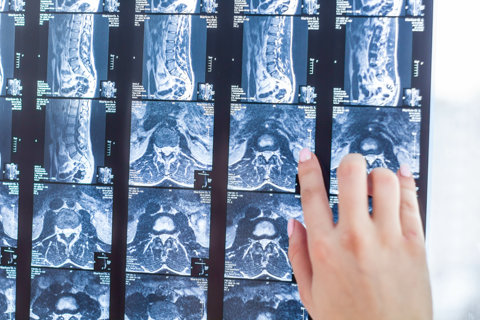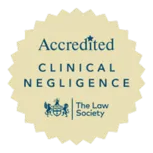
Claiming Compensation for a Cerebral Palsy Birth Injury
If your child has sustained a Cerebral Palsy birth injury, you may be entitled to compensation, to get the care and support they will need throughout their life.


Solicitor, Medical Negligence
Our client Mrs B, began to suffer with very severe back pain accompanied with reduced sensation and numbness on the left side of her saddle region. These symptoms persisted over the next day, so she rang NHS 111 and was advised to attend an out of hours GP service (OOH).
Following an examination, the doctor recorded a partial left-sided saddle block and referred her for an immediate orthopaedic review. She attended the A&E department of her local NHS hospital, where an orthopaedic specialist examined her and advised she could go home as soon as she passed urine. She was prescribed analgesia and advised to contact her GP to book an appointment with a Consultant.
Over the next day, she began to pass urine more frequently than usual and the numbness was radiating to her right side. She booked an appointment with her GP, who immediately referred her back to the A&E department of the Defendant hospital with suspected Cauda Equina Syndrome. She underwent an MRI scan which confirmed the Cauda Equina Syndrome diagnosis, before undergoing an emergency operation.
Mrs B remained in hospital for a further two weeks following surgery. She suffered completely avoidable bladder and bowel complications due to the delay in operating. This had detrimental effect on her psychological state and the relationship with her husband. Furthermore, she was unable to carry out the same job she previously had, and suffered a devastating loss of income.




National Center for Biotechnology Information. (2019). Cauda Equina Syndrome. In StatPearls. Retrieved from https://www.ncbi.nlm.nih.gov/books/NBK551715/
National Institute for Health and Care Excellence (NICE). (n.d.). Analgesia - mild to moderate pain. Retrieved from https://cks.nice.org.uk/topics/analgesia-mild-to-moderate-pain/
Simpson Millar LLP. (n.d.). Cauda Equina Syndrome Claims. Retrieved from https://www.simpsonmillar.co.uk/medical-negligence-solicitors/cauda-equina-syndrome-claims/
American Academy of Orthopaedic Surgeons. (n.d.). Cauda Equina Syndrome. Retrieved from https://orthoinfo.aaos.org/en/diseases--conditions/cauda-equina-syndrome/
NHS Resolution. (2023). Annual report and accounts 2022/23. Retrieved from https://resolution.nhs.uk/wp-content/uploads/2023/07/NHS-Resolution-Annual-report-and-accounts-2022_23-3.pdf
Fill in the form below to get in touch with one of our dedicated team members, or call our team today on: 0800 260 5010